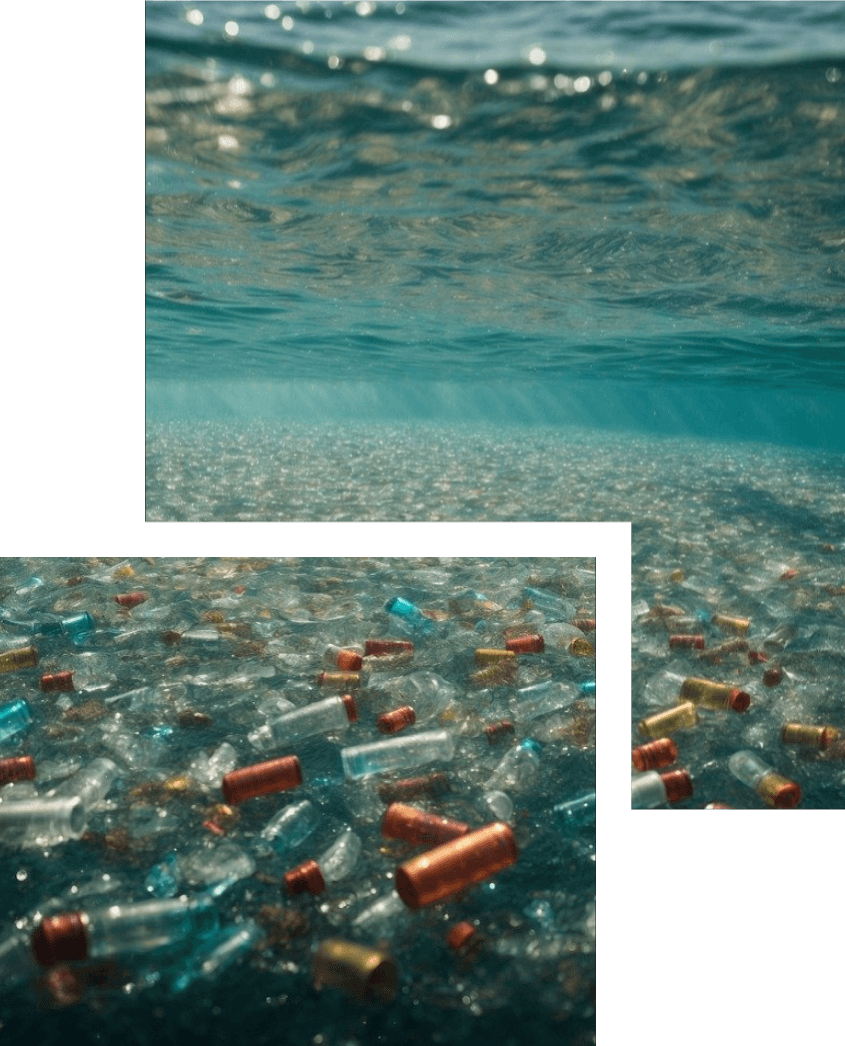

A Cleaner, Healthier Ocean
Our goal is bold yet essential: To rally collective efforts and channel resources into the monumental task of cleaning up the ocean garbage patches. These floating islands of waste, predominantly plastic, are more than just an eyesore, they are a ticking time bomb for our marine ecosystems.
But our journey is more than a battle against pollution. It's a celebration of the ocean's magnificence, a recognition of its invaluable role in our lives, and a commitment to safeguard it for generations to come. By restoring the health of our oceans, we're not just preserving marine habitats; we're upholding the health of our planet, our societies, and ourselves.

Understanding
the Ocean Pollution Crisis
The challenge we face in the oceans is immense, and understanding its magnitude is the first step towards a solution. Our oceans are besieged by vast swathes of floating waste, primarily plastics, which have accumulated into what are known as garbage patches. Here, we dive into the data, revealing the size and location of these menacing environmental threats.
+1.6M
square kilometers of garbage patchsGreat Pacific Garbage Patch:
The largest known garbage patch, located between Hawaii and California, spans an estimated area of 1.6 million square kilometers, an area twice the size of Texas.
Other Major Patches:
Besides the Great Pacific, there are significant patches in the Atlantic and Indian Oceans, each with its unique complexities and impacts on the marine environment.
+80%
Is Plastic wastePredominantly Plastics:
Over 80% of the debris in these patches is plastic, ranging from large discarded fishing nets to microplastics invisible to the naked eye.
Longevity Of Pollution:
Plastic in these patches can persist for decades, slowly breaking down into microplastics, posing a persistent threat to marine life and ocean health

When the Oceans
Suffer, We All Suffer
The silent crisis brewing in our oceans isn't just an environmental issue; it's a clarion call for humanity. Ocean pollution, especially in the form of vast garbage patches, has far-reaching and severe consequences that extend beyond marine life, affecting biodiversity and human health.
1. Marine Life in Peril
Disrupted Food Chains
From microscopic plankton to majestic whales, ocean pollution disrupts essential food chains, leading to diminished fish populations and weakened marine ecosystems.
Entanglement and Poisoning
Marine animals often become entangled in larger debris or ingest plastics, leading to injuries, poisoning, and often fatal consequences.
Habitat Destruction
Pollution alters and destroys crucial habitats such as coral reefs and mangroves, which are vital for numerous marine species.


What's at Stake?
The health of our oceans directly impacts the health of our planet and all its inhabitants. It's not just an environmental concern, it's an issue that touches every aspect of our lives.

Solutions to Ocean Pollution
Our plan For cleaning The Ocean
Whether you're someone who loves the ocean, a concerned citizen, or a nature enthusiast, your involvement is vital. You'll experience the gratification of removing plastics, nets, and other pollutants from the water, helping to restore the natural beauty and health of our marine habitats.

